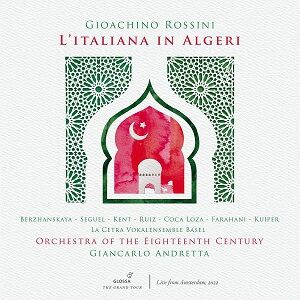
Gioachino Rossini (1792-1868)
L’italiana in Algeri
Dramma giocoso in two acts. Libretto by Angelo Anelli.
First performance: Teatro San Benedetto, Venice, 22 May 1813
Mustafa – Ricardo Seguel (bass-baritone)
Lindoro – Alasdair Kent (tenor)
Isabella – Vasilisa Berzhanskaya (mezzo-soprano)
Taddeo – Pablo Ruiz (baritone)
Elvira – Lilian Farahani (soprano)
Zulma – Esther Kuiper (mezzo-soprano)
Haly – José Coca Loza (baritone)
La Cetra Vokalensemble Basel
Orchestra of the Eighteenth Century/Giancarlo Andretta
rec. live, 19 February 2022, Concertgebouw, Amsterdam
Libretto with English translation enclosed.
Reviewed as download from press preview.
Glossa GCD921132 [2 CDs: 134]
L’Italiana in Algeri was, next to Tancredi, Rossini’s break-through as an opera composer. They premiered within a few months of each other in 1813 when Rossini had just turned 21. It was also my first Rossini opera when I started collecting LPs in the early 1960s – the Decca recording under Silvio Varviso with Teresa Berganza as Isabella, which has remained my favourite ever since. I have acquired Marilyn Horne and Agnes Baltsa as well, but neither of them has managed to dislodge my attachment to Berganza/Varviso. A matter of personal taste, of course, and in their own right, without odious comparisons, many of the existing recordings work perfectly well as the only recording for those who feel no need to own multiple versions. I’m sure this new recording can fill that function admirably.
The plot is amusing – easier to digest than many similar ones – and the music is absolutely riveting. After the well-known overture and the opening chorus of eunuchs – why, by the way, is it set for a mixed-voice chorus? By definition, eunuchs are castrated and thus should sing with soprano and alto voices – or have I missed something in my education? – the music fizzes along with high spirits and rhythmic elan. The chorus, La Cetra Vokalensemble Basel, has a lot to do throughout the opera, the secco recitatives are generally swift, all the main characters are vouchsafed gratifying solos and the two act finales are impressive and monumental intensifications in the typical Rossinian manner. Even as a pure listener one, is almost exhausted after the final chords. Giancarlo Andretta leads the estimable Orchestra of the Eighteenth Century with firm but flexible hands – and as is common with Rossini’s orchestrations, there are plenty of opportunities for instrumental solos. One of the more spectacular ones is the French horn in Lindoro’s cavatina in Act I (CD 1 tr. 4).
The cast is multinational – no Italian, however – and largely youngish, and there is real freshness about the singing. This is especially valuable in the minor roles, where Lilian Farahani (Elvira) is as fresh as dew, and Esther Kuiper’s mezzo is a well-contrasted Zulma. José Coca Loza’s baritone is well-suited to Haly, the Captain of the guard, who also has an aria in the second act: Le femmine d’Italia (CD 2 tr. 14), though it is not by Rossini. Pablo Ruiz is an excellent Taddeo and Ricardo Seguel is a powerful and technically accomplished Mustafà. Together they and Lindoro are great in the terzetto in Act II (CD 2 tr. 17) where Taddeo dictates what a “pappataci” must do and Mustafà repeats – a comical highpoint. Australian born Alasdair Kent sports a beautiful tenore di grazia, singing with great care for nuances and also has the coloratura capacity for elegant embellishments and in his cavatina at the beginning of the second act (CD 2 tr. 4) also rips off a perfect trill.
On top of all this, Russian mezzo-soprano Vasilisa Berzhanskaya is a superb Isabella. She obviously has a phenomenal vocal range, starting out some ten years ago as the Queen of the Night and now qualifying as a deep contralto – ideally equipped for this role. You need only listen to her cavatina in Act II (CD 2 tr. 10) and savour her dark timbre – so perfectly seductive. She is only thirty and should have a long, glorious career before her. Even today, she should qualify as a member of the royal line of great mezzo-sopranos during the 21st century. This recording is worth owning for her participation alone, but her colleagues are certainly highly qualified too, even if they haven’t same amount of personality as Luigi Alva, Rolando Panerai and Fernando Corena on the Berganza recording, my benchmark.
Let me just add that the acoustics of the Concertgebouw in Amsterdam contribute to the overall excellence of this issue, and that the enthusiastic ovations are stimulating and well deserved. They could possibly become tiring with repeated listening, but this can be easily attended to with the fast-forward button. All in all, this is a very attractive recording with a lot of good singing, not least from the superb Vasilisa Berzhanskaya.
Göran Forsling
Help us financially by purchasing from





















